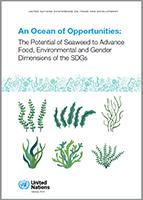An ocean of opportunities: The potential of seaweed to advance food, environmental and gender dimensions of the SDGs

Within a sustainable ocean economy, seaweed collection, culture, processing, and trade is one of the sectors with the most opportunities to achieve sustainable growth by 2030.
Seaweed farming culture is closely linked to food security, income, livelihoods, and traditional knowledge of rural coastal communities, particularly for women and Indigenous Peoples.
The value of the seaweed sector remains mostly underappreciated and untapped, while it shows clear growth potential beyond its current markets.
This study aims to contribute to a greater understanding of the seaweed sector as a driver of food security and women’s empowerment while addressing the interlinkages between food security, environmental sustainability, and trade.
The study analyzes the seaweed sector and explores its linkages with food and nutrition security and environmental sustainability. In doing so, it collates the most recent available data and evidence on seaweed production and trade with a focus on developing countries.
It pays special attention to the role of women in the sector at every step of the seaweed value chain. In addition, the study focuses on three concrete and practical examples of how women’s participation in the seaweed sector acts as a catalyst for their economic empowerment and the promotion of sustainable practices in the industry in the United Republic of Tanzania, Portugal, and Kenya.
The concluding section identifies main responses to challenges and opportunities for developing a sustainable and gender inclusive seaweed sector and identifies some research gaps for future work.
The current state of the regional and subregional seaweed industry, trade flows and women’s participation, with separate analyses for developing and developed countries, can be found in the Annex.
The study has benefited from receiving valuable input and peer review from numerous experts, as well as representatives from relevant organizations such as FAO and the Global Seaweed Coalition.


